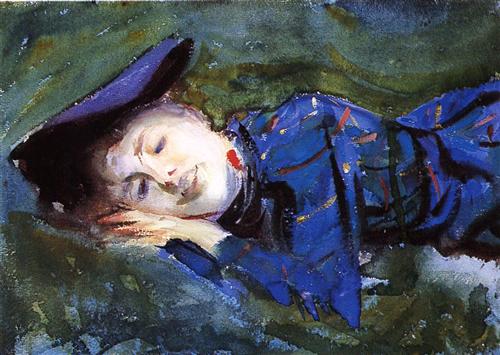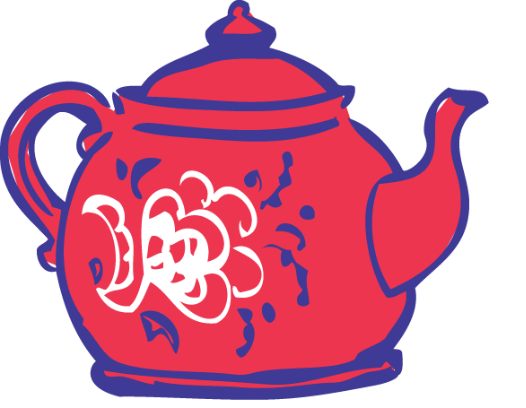
John Singer Sargent, Violet Resting on the Grass
By Julie
A joke had been making its rounds at dinner tables of Soviet émigrés in the early 1990s. It went like this: Shortly before parting, two families hatch a plan for the party leaving to signal to the one yet to follow, how they like it in America. “Let ‘aching feet’ be our code for happiness,” they agree. “If we write that our feet hurt badly, you will know that it is safe for you to leave.” After some time, a letter arrives to the Soviet family’s home. Eager to discover how their blood has fared abroad, the kin scan the message for signs of American bliss. True to form, the letter begins: “Dear all, we have finally made it to America and have started to settle, in. What we do most here is walk, but from all of this walking our feet have started to really hurt. In America, one has to do an awful lot of walking. America is like a treadmill. Once you get on, you cannot get off. You must keep walking. Our feet are full of blisters. We’re all but crippled by the pain.” Forgetting the code, the father drops his head, despondent. “If they are in so much pain in America, why are we in such a rush to leave Russia?” The anecdote points to what only a family that has gone through immigration can appreciate: the discouraging sacrifices immigration requires of its participants turns a coded “pain” to real pain and endurance; it turns mis-recognition to fact.
My sister and I were not told that we were leaving until the last possible moment though clues that pointed to special developments in our family affairs slowly filled the apartment. When our grandmother spoke by phone to my uncle, the first of our family to immigrate overseas, her raised and anxious voice already announced that an exchange was taking place with somewhere important and far away. As she danced across the bedroom, to which she uselessly retreated for privacy, she would all but jump into the phone to reach him on the other side through sheer vocal power. All the while, our curiosity was only piqued by our mother’s foreboding looks and threats to keep quiet. All this even before the suitcases that were placed behind our parent’s oversized bed appeared without explanation.
Every now and again, when we’d lock ourselves in our parents’ bedroom to jump on the bed like a trampoline, we’d catch glimpses of these heavy, gray leather trunks that promised a world of adventure by their very existence. When our parents were not looking, or were too busy to notice, my sister and I would drag the trunks over to the closet and prepare each one for departure, lining the inside with neatly folded shirts and pants, dresses and socks, linens and towels. We’d push the brimming luggage down the hall and into our bedroom. There, sitting on the bright green rug that covered the floor– one that I always imagined was like a green pasture — we embarked on our travels. Hours later, exhausted but satisfied, we would abandon our treasures on the bedroom floor. When she’d discover our secret getaway , our mother would force us to put everything back as neatly as we found it before going to bed. There was little I dreaded more than the injunction to unpack.
When relatives came to visit, adults were frequently ensconced in the kitchen, leaving the kids huddled by the door to listen for terms of grave importance. Our father, noticing the play of shadows at the door, always appeared in the threshold to disarm our covert operations. “Where is America?” we’d sheepishly probe. He’d smile at our naive questions, but sternly warned that some conversations were for adults only. Then, one day, an English teacher arrived and my sister and I were made to endlessly pronounce the imperceptible differences between “sheep” and “ship,” “thin” and “tin.”
Among friends, these stolen secrets and family curiosities were a valuable commodity. America was like a gold card my sister and I could trade for gum or toys or favors. Under vows of silence from our friends we confessed with excitement that we had a relative who lived abroad, in America, a country to which we proudly felt a metonymic connection. “What is it like?” they wanted to know. I could only imagine it as a magical, green lawn.
Then there were real trips. Twice to Moscow, which bolstered our bragging rights at school for having flown in a plane. And one on which our father left alone and brought back two expensive leather coats for my mother and himself. Slowly, the dusty suitcases in the bedroom started filling up with things: linens and sheets and clothes that no one was asked to put back. When our parents finally stated the obvious, the bags were full.
To ameliorate the shock of the announcement, they pointed to the new clothes that we had accumulated, more of which, they promised, were to come in America. Never mind the clothes — we looked forward to a ride on an international plane. We only later learned that to finance the trip, our parents had to sell practically everything we owned. Crossing the ocean, we passed the time by imagining our new life abroad, distracted from the sight of our father crying in the window seat by a cool can of Coca-Cola. Imbibing that sacred liquid for the first time felt like consuming the American dream.
After a long journey, our uncle rushed to greet us at the busy JFK airport. Short and bald, he was hardly the man of mystery we had imagined huddled on the other side of the phone . Once we claimed the luggage, the family piled into his beat-up station wagon. Eager to impress us, he forced a detour on the way to our new home in Queens and drove us through the expensive Forest Hills Gardens, lined with century-old mansions and luscious, brimming green lawns. For a moment, it seemed that somehow my vision proved true, America really was green and beautiful, just as I had imagined. Then, he got back on the highway and continued to our new home, a simple second floor walk-up on an urban street. We got out of the car, stretched our legs and finally took in that long-awaited sight. Our feet ached a bit from being confined inside for so long. There was not a green lawn in sight.
